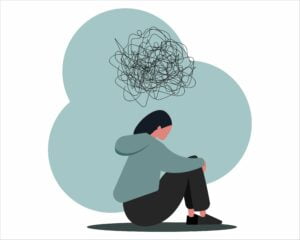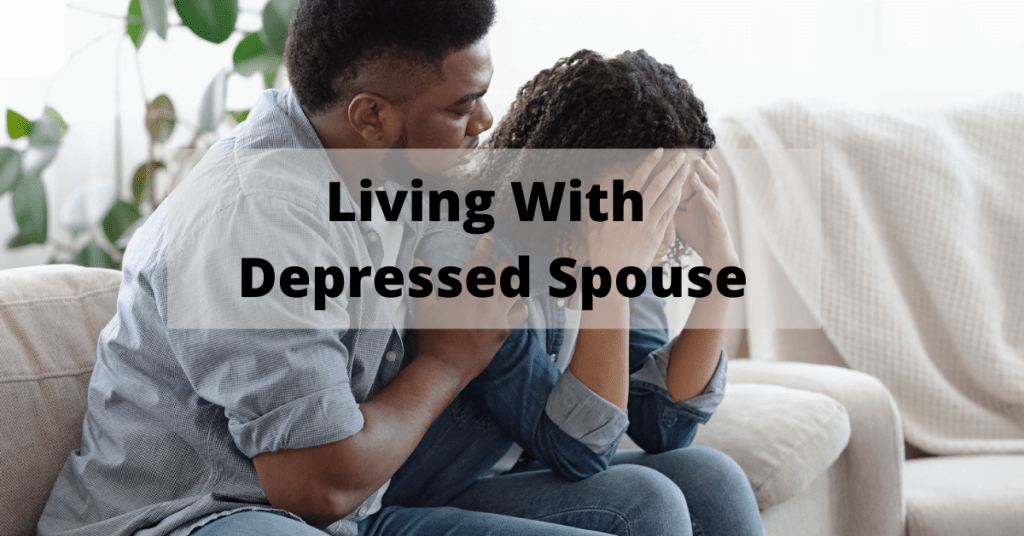Living with a depressed spouse can be tough. It is hard to live with someone who is constantly unhappy and always feeling like they are worthless. When you love your partner, it feels natural to want to help them get through the difficult time in their life. This is so that they can see how much worth they have. But when you know nothing about depression or don’t have any experience living with a depressed person, it may seem impossible to understand what your spouse needs from you. You don’t know how to offer support. In this guide, we will go over some of the most important things that partners should do for their spouses when living with a depressed individual.
Contents
What Is Depression?
 Depression is a medical condition that causes serious symptoms. It can interfere with normal life activities, work, and relationships. Depression affects how you feel, think and act on a daily basis—and it’s not just feeling sad or blue for a few days. Symptoms must be present most of the day every day for at least two weeks to diagnose depression (this includes feelings like hopelessness). Some people experience only one depressive episode in their lives while others may have recurrent episodes over many years; however, each individual episode lasts longer than other times they felt depressed before. When left untreated, depression will last for six months or more.
Depression is a medical condition that causes serious symptoms. It can interfere with normal life activities, work, and relationships. Depression affects how you feel, think and act on a daily basis—and it’s not just feeling sad or blue for a few days. Symptoms must be present most of the day every day for at least two weeks to diagnose depression (this includes feelings like hopelessness). Some people experience only one depressive episode in their lives while others may have recurrent episodes over many years; however, each individual episode lasts longer than other times they felt depressed before. When left untreated, depression will last for six months or more.
How Does Depression Affect Relationship?

Living with a depressed spouse is never easy. Depression has a huge effect on your relationship with your spouse. Depression can bring about feelings of irritability, anger, and resentment towards their partner—even if they know it’s not the person’s fault. It is important to remember that someone experiencing depression may not be aware or in control of these negative emotions; however, this does not make them feel any less real.
These are some of the effects of depression on relationships:
Affects Day-to-Day Activities
This affects your spouse’s ability to perform day-to-day activities, such as going to work or school. Spouses may also have a hard time keeping up with hobbies and interests they once enjoyed.
Affects Communication
Depression can interfere with communication between partners—it makes it harder for someone experiencing depression to be engaged in conversations or open up to their spouse. It can also cause them to withdraw from their partner and spend more time alone, or it may even bring about hostility, anger, and irritability towards the other person in the relationship—which can lead to arguments that are hard for both of you to overcome.
Affects Trust
Spouses often feel betrayed by their partners when they cannot trust them because depression causes someone with this condition not to be themselves anymore; however, people experiencing depression typically have little control over how they feel on a day-to-day basis. Those who love someone struggling with mental illness need patience as well as reassurance that things will get better again if there is treatment for depression—this means recognizing what your role is in your loved one’s life and how you can help them.
Affects Sex Life
The reports are that around 31 percent of people who struggle with depression also have issues with their sex life. This could be due to a decrease in interest in sex, difficulty becoming aroused, or not being able to reach orgasm. Lowered libido can put stress on the relationship and may even lead to arguments.
Harms Self- Esteem
People experiencing depression often have negative thoughts about themselves. This can lead to less confidence in yourself, feeling inadequate compared to others around you, and even being ashamed of who you are. It is important for partners not to minimize the feelings their loved ones experience because it may cause them more harm than good by reinforcing negativity that they already feel towards themselves.
Increases Awkwardness
Spouses have reported that their partners who are depressed seem to feel more awkward around them—and this makes it incredibly difficult for both of you to spend time together.
Shows Disinterest In Relationship
This can make the relationship look like there is no future because someone experiencing depression may withdraw from his or her partner, and they do not show interest in spending much time with each other anymore. This usually means less communication between spouses, which inevitably leads to disagreement over things like household chores and parenting duties; however, these conflicts typically bring about even more emotional distance within the relationship.
How To Live With Depressed Spouse?

There are many tips on living with a depressed spouse. Some of these are:
Be Patient
This is probably the most important thing you can do. Someone with depression may not be themselves anymore, and they may lash out at you for no reason. Remember that it’s not their fault—and be there to support them through their tough times. Patience sometimes means tolerating a lot of things you’d rather not tolerate, but it’s all worth it when your spouse realizes they can get better again.
Be Understanding
People dealing with depression need support from family and friends because living alone is usually not the best option for them—and that includes being in a relationship. By understanding their struggles and encouraging them to seek treatment, you are giving this person hope for recovery. Those who love someone with mental illness should remember to never give up on them no matter how tough times may seem; at the same time, fighting over every little thing will only make everything worse between both of you so try finding compromises instead which will help move forward as one big happy family.
Live Your Own Life Too
Spouses of people with depression shouldn’t feel like they have to give up their own life just because someone in the family is dealing with this condition. You can still go out and do things that you enjoy, such as going on a date night or joining an exercise class together—except doing these activities when your spouse isn’t feeling well might not be much fun for either of you; so even if it means spending time alone while they rest (or sleep) at home, remember that there’s nothing wrong with giving yourself some “me” time once in a while.
Help In Treatment
This is one of the tips for living with a depressed spouse. If your spouse is willing to seek treatment, offer to help out by doing things like attending therapy sessions together or researching different treatments. This will not only make them feel supported but will also help you learn more about the condition and how to best support your spouse in their journey to recovery.
Encourage Them To Seek Help
One of the most important things you can do as a partner encourages your loved one to seek professional help. Depression is a serious mental illness that should not be taken lightly; left untreated, it can lead to bigger problems down the line. If your spouse isn’t ready for treatment yet, don’t push them—but continue being there for them and let them know that you’ll be there when they’re ready to seek help.
Talk About Things
If you feel like a serious problem is brewing between the two of you, don’t hesitate from talking about it right away—even if they seem reluctant at first because chances are they aren’t comfortable either and just need some time to process their thoughts or emotions before communicating them with someone else. Spouses who live together should make sure that they talk things out as much as possible so each person feels heard and understood even when problems may arise. Don’t forget that your love for one another will get both of you through whatever challenges come along the way!
Create Good Environment
If your spouse is depressed, they may not want to do anything but sleep. It’s important that you create a healthy living environment for them by doing things like keeping the house clean and well-lit (turning on lights during nighttime can be helpful too), preparing delicious meals so they don’t have to worry about cooking right away, and generally staying cheerful even when times get tough—all of these will help boost their mood gradually until they finally feel ready to fight back against depression.
Focus On Small Things
In the midst of all this, it’s important to remember that your spouse is still the same person they’ve always been and will appreciate little things like a hug, kind words, or just listening to them without judgment. When you focus on the small things, it can help remind both of you that there are good moments even in the darkest times.
Show Them You Care
One of the best ways to show someone you care is by simply being there for them—no matter what. This means being understanding when they’re feeling down, lending an ear when needed, and not giving up on them no matter how bad things may seem. Just knowing that somebody loves them and wants them to get better is often enough motivation for people with depression to start working on themselves.
Notice Signs of Self-Harm
If you notice your spouse harming themselves—even in an indirect way, such as by neglecting their own health or slipping into substance abuse—don’t be afraid to bring it up. Sometimes people might think they can handle things on their own but need help from someone else more than anything; if this is the case with your loved one, let them know that there are resources available for dealing with depression and other mental illnesses that don’t involve hurting oneself.
Help Them Connect With Other People
Depression can often make people feel isolated, so one of the best things you can do as a partner is helping them connect with other people. This could mean joining a support group together or simply introducing them to friends and family members who will be understanding and supportive. Feeling connected to others is an important part of recovering from depression, so don’t hesitate from helping your spouse build meaningful relationships with the people around them.
Conclusion
Depression is a difficult issue to live with and it can be hard for those who are living with a depressed spouse. It’s important that we don’t take this on alone, but instead, find support from others like us. There are many resources out there such as counseling or other groups where you could meet people who understand what you’re going through.
For more information, please contact MantraCare. Relationships are an essential part of human life. It is the connection between people, and it helps us to form social bonds, understand and empathize with others. If you have any queries regarding Online Relationship Counseling experienced therapists at MantraCare can help: Book a trial therapy session


